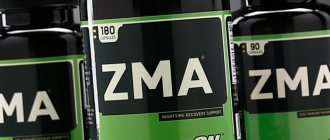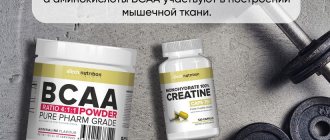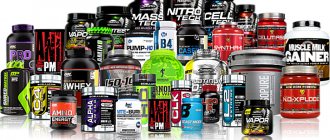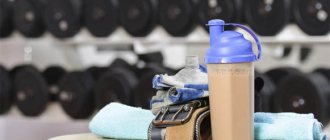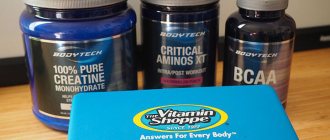Lysine is a powerful fighter against viruses, especially herpes and respiratory infections. Helps produce antibodies, strengthens the immune system, promotes the production of collagen, muscle protein, growth hormones, and makes hair healthy.
Valine – named after valerian. It provides us with energy, promotes tissue growth and regeneration, and is necessary for the normal functioning of the brain.
Tryptophan - helps fight insomnia, bad mood, depression, stabilizes appetite, lowers cholesterol, dilates blood vessels, helps synthesize growth hormone, serotonin, niacin or vitamin B3.
Isoleucine is essential for athletes, increases endurance, accelerates muscle recovery, fills with energy, participates in hemoglobin synthesis, and regulates glucose levels.
Methionine is essential for normal digestion, elimination of fats and toxins, and is necessary for humans to produce creatine, which increases endurance.
Threonine is especially important for children, as its participation is necessary for the creation of strong bones, muscles, and for the synthesis of elastin and collagen. Threonine is needed for the nervous, immune, circulatory, and digestive systems to function normally. Prevents the accumulation of fats in the liver.
Arginine is necessary when the body is growing, sick or aging, because then its production is insufficient. Enhances the production of growth hormone, rejuvenates the body, stimulates the immune system, and helps reduce the layer of subcutaneous fat.
Histidine - takes part in the process of hematopoiesis, the formation of hemoglobin, gastric juice, enhances libido and prevents the appearance of allergies and autoimmune reactions.
How is L-Carnitine beneficial for runners?
Carnitine is a kind of energy drink. But it stimulates the body to take energy not from the carbohydrates that we ate for breakfast, but from subcutaneous fat. The effect of this sports supplement lasts approximately 6 hours.
No, of course, you won’t experience a bright energy surge, but you will feel like your body is saturated with energy. Among its other benefits, it has a beneficial effect on the immune system and, of course, fat-burning properties.
L-Carnitine is best purchased in specialized sports nutrition stores, rather than in a pharmacy. In the first case, you will receive a product specifically for athletes, while the pharmacy option is more suitable for those who lead a sedentary lifestyle.
The best time to take it is in the morning on an empty stomach or before the workout itself (40 minutes before the start). The duration of taking the supplement should not be more than two months. After completing the course, it is better to take a break so that the body does not get used to producing carnitine independently. Professional runners typically take this drug in preparation for competition.
Relative contraindications
The multicomponent composition of the gainer works at almost all levels of energy metabolism. However, it should be noted that the predominant component is carbohydrates. This is justified from the point of view of metabolism during active sports, but it is unacceptable and sometimes even dangerous for some categories of people.
These include, first of all:
- people with slow catabolism and a tendency to be overweight;
- athletes with a hypersthenic body type;
- persons who exercise irregularly;
- people just starting active strength training or running (no matter for the first time or after a long absence, illness, recovery period).
In any case, before starting to take the drug, it is better to consult with your doctor or trainer.
Are BCAA necessary?
This complex of three essential amino acids is best taken during periods of high intensity. That is, if you train for a very long time and hard and feel that you no longer have time to recover for the next sessions, then BCAA will help you.
It’s worth mentioning separately about sprinters: for them, such sports nutrition is simply irreplaceable. Training for this category of runners is usually accompanied by super intensity, against which muscle fibers are easily torn and destroyed. And it is precisely in order to be ready for the next workout that sprinters consume BCAA.
Those who do amateur running, especially over long distances, can also recommend BCAA. This supplement will protect your muscles while running and will not allow their volume to decrease.
It is best to take BCAAs before and after training. If you drink while running, you can add BCAA to your shaker.
Possible problems
In people who are prone to obesity and do not engage in intense training, taking a gainer in excess of recommended doses can lead to the deposition of fatty tissue, especially in the so-called “dead zones”.
Exceeding the dose recommended by the manufacturer puts excess stress on the kidneys, disrupts water-salt and carbohydrate metabolism, increasing the risk of obesity, inflammatory diseases of the kidneys, heart, and impaired glucose tolerance.
Recommendations for storing opened packaging should be strictly followed to avoid damage to the product, which cannot be visually determined, but this carries a certain risk of developing foodborne illnesses.
In general, a properly used running gainer will allow you to achieve an optimal level of fitness with maximum effort, but without losses for the body.
How does protein help?
Sprinters need protein more; marathon runners don’t need to focus on this. It is important for sprinters to maintain muscle mass in their legs, because the main emphasis in the exercises is on strength training. It is recommended to take this sports nutrition during the so-called peak of exercise. However, it can be consumed more often, especially if there is a lack of protein in the daily diet.
The best form is, of course, protein isolate. Firstly, it is absorbed faster. Secondly, it contains much less impurities (carbohydrates, fats, etc.).
Take protein several times a day: for example, in the morning, after training and before bed.
Nutrition for long low-intensity training
Endurance training is running at a low heart rate for a long time. The essence of such training is to prepare the athlete for a race that must be completed in 90 minutes or more. The nutrition of a marathon runner must correspond to the level of energy expenditure.
If an athlete runs for 2 hours or more, it is necessary to replenish glycogen stores with carbohydrates in the amount of 30 g every 30-45 minutes. gels, raisins, gelatin candies and energy drinks are good for this purpose
On race day, choose foods high in complex carbohydrates. Eat only foods that you have tried before and that are guaranteed to not cause digestive problems.
After a strength-depleting endurance workout, glycogen levels need to be fully restored. Carbohydrates and proteins, normally 1–1.2 g/kg BW and 0.25 g/kg BW, respectively, should enter the body within the first hour after the race. Then you need to follow the same pattern every 2 hours, until the main meal.
Approximate carbohydrate intake rates for men and women at various load levels are presented in the table:
| Training intensity | Situation | Carbohydrate consumption by men, g/kg BW | Carbohydrate consumption by women, g/kg BW |
| Low | Low heart rate training about three times a week | 3-5 | 2-4 |
| Average | Moderate physical activity (about an hour a day) | 5-7 | 3-5 |
| High | High-severity loads with a pulse of 70% MHR | 8-12 | 8 |
| Endurance | Low to moderate exercise 1-3 hours per day | 6-10 | 5-7 |
You can calculate your heart rate zones HERE.
Creatine is the best sports nutrition for short distance runners!
Creatine is truly the best supplement among all sports nutrition for sprinters. The fact is that for short-distance runners, a strong and sharp push off the ground during the start and throughout the run is extremely important. And this indicator, first of all, depends on the athlete’s muscle strength, which can be increased with the help of creatine.
Creatine itself is found in meat products. However, a sufficient level of this substance to prepare for competitions is simply impossible to achieve physically: well, you won’t be able to eat that much meat. Creatine monohydrate powder makes life easier and gives you the opportunity to increase strength. And this is true: many short-distance runners note its effectiveness.
It is best to take creatine before training (30 minutes before the start). It is better to structure the course so that the last week of admission (the duration of the course is about a month) falls during the competition. It is at this time that your creatine levels will be at their best and you will be able to show your maximum results.
Fluid intake[edit | edit code]
Elite marathon runners consume very little fluid during races that they complete in less than 2 hours and 30 minutes. However, they can withstand a 1-2% loss of body weight at temperatures above 22°C, the main reason for which is considered to be water loss (higher fluid loss during the marathon leads to dehydration and related problems).
The International Association of Marathon Medical Directors recommends a fluid intake of 400-800 ml/hour for marathon racing, with faster, heavier runners and warmer weather conditions requiring more fluid than slower runners running the race. in cooler environmental conditions. This recommendation seems to make the most sense, but individual runners should determine their individual fluid needs rather than rely on general guidelines.”
Drink water with your meals.
Water is well absorbed, and some modern sports drinks are absorbed just as well.
Avoid large amounts of sugary foods as they tend to retain fluid in the stomach and may cause bloating. Drink most of your water or drink 4-8 hours before your race and try to stay well hydrated until you start, but of course don't overdo it so you don't have to run to the bathroom every 10 minutes. Read the main article:
rehydration.
Do you need a pre-workout for running?
Pre-workout supplements are a great help during the competition itself. Thanks to their action, you can warm up perfectly and feel a fairly noticeable surge of strength, energy and motivation. Energy drinks allow you to run faster and longer, and withstand more intense loads. They will likely be more suitable for marathon runners than sprinters.
But, it is worth considering that such an ultra-intense load like running increases the heart rate several times, and stimulants in the pre-workout even enhance this process! So be careful, start with half a serving and monitor how you feel.
Buy
Vitamin D3
What is it needed for
Vitamin D3 is necessary for the normal functioning of the nervous and immune systems, bone health, and maintaining optimal body weight. For athletes, vitamin D3 deficiency is fraught with slow-healing fractures, heart disease, high blood pressure, and osteoporosis.
How does the deficiency manifest itself?
Detecting a deficiency is not easy: at first, the symptoms are subtle and manifest as weakness and body aches, and as the situation worsens, they can manifest as bone pain and general weakness. You can reliably find out about a deficiency or excess of vitamin D3 in the body by taking a blood test from a vein for 25(OH)D.
Daily requirement
The daily requirement for vitamin D is 2.5-5 mcg. Lack of ultraviolet exposure, naturally dark skin, vegetarianism, and low-fat diets increase the need for vitamin D.
Where is it contained?
To prevent a lack of the sunshine vitamin, you should spend as much time in the sun as possible at any time of the year. You should add to your diet: fish oil, egg whites, low-fat fish and caviar, cod liver, some types of mushrooms, cheese, butter, dairy products.
Vitamins and minerals are essential sports nutrition for runners!
Again, vitamins from the pharmacy will not work because they are not intended for athletes. Athletes need more powerful supplements, which means vitamins and minerals must also be in the appropriate form and form.
It is best to look for a vitamin and mineral complex in sports stores. You also need to approach your choice wisely, so as not to get the opposite of vitamin deficiency - hypervitaminosis. It is no less dangerous, in fact, for humans and the body as a whole.
If you are a professional runner, it is recommended to take multivitamins during the period of preparation for competitions. If you are an amateur runner, then take the complex several times a year.
Calculation of daily caloric intake
The average daily consumption of products should satisfy the athlete's needs for energy and recuperation. This balance is determined based on the calculation of the Basal Metabolism Level (BMR) indicator.
VOO is the level of energy expenditure sufficient to maintain the vital functionality of the body under conditions of rest and comfortable ambient temperature.
The value of the basal metabolic rate (kcal/day) depends on the following factors:
- Floor
- Body weight (MT, kg)
- Height (R, cm)
- Age (B, years)
The SRL indicator for men is calculated using the following formula:
66.5 + (13.7 × MT) + (5 × P) – (6.8 × V)
For women:
65.5 + (9.6 × MT) + (1.8 × P) – (4.7 × V)
The final value shows how many kilocalories need to be consumed per day if the body experiences minimal stress. The level of energy expenditure depends on physical activity. Activity is determined in accordance with coefficients (K) developed in 1985 by FAO together with WHO.
Energy Consumption (EC) is determined by the formula:
RE (kcal/day) = K x UOO
The values of the coefficients for athletes with different levels of physical activity are presented in the table:
| Load | Quiet work + running load less than 60 km per week | Running training (from 60 km per week) |
| Men | 1,64 | 1,82 |
| Women | 1,78 | 2 |
For example, a 25-year-old athlete with a height of 175 cm weighs 65 kg and runs more than 60 km per week. His basal metabolic rate will be:
UOO=66.5 + (13.7 * 65) + (5 * 175) – 6.8 * 25) = 1662
Let's determine the average daily energy consumption:
RE=1.82*1662=3025 (kcal/day)
This means that to replenish energy costs, a runner must consume 3025 kcal per day.
Isotonics and energy drinks
There is one rule that says that for a workout that lasts less than an hour you need water, and for more than an hour you need an isotonic drink. Another situation in which this supplement will also be extremely useful is exercising in the heat, when you sweat a lot and lose a lot of water.
An isotonic drink is essential during the marathon to restore salt balance and prevent cramps. It is best to drink this supplement during and after training. Naturally, if you are running a marathon, half-marathon, or even worse, an ultra-marathon, then there is nothing to do without an isotonic drink.
As for energy drinks, they are best taken in two cases:
- During the period of preparation for a long-distance race;
- Directly during a long distance race.
The first option seems to complement the second for the simple reason that the body needs to get used to various types of energy drinks. Otherwise, you may feel bad during the race and drop out. Therefore, if you plan to use this type of sports nutrition, then it is better to immediately “test” it on yourself, look at the body’s reaction, and, if everything is fine, then continue to use it until the race itself.
Take isotonic drinks during training. Some additives are added in powder form to water, and some are available directly in the form of ready-made drinks.
Summary
When you start training, notice that your body's need for nutrients increases. They can be obtained both from regular food and from sports supplements. In general, recreational runners do not need to take any sports nutrition regularly, but it can help balance their diet.
During training, we recommend drinking isotonic water. It helps restore water-salt balance in the body, prevent muscle cramps and maintain performance.
At important starts, nutrition depends on the length of the distance. During sprinting, creatine helps to increase strength for a short period of time. At medium and long distances, L-carnitine increases endurance, and gels prevent you from getting hungry. On an ultra-long run, the bars help you reach the end.
Sports nutrition for runners: marathon runners and sprinters - special assembly from Fit Magazine
To make it much easier for you to decide on a set of sports nutrition that will help improve your results, we decided to give you a few examples of supplements. It is enough to select one supplement from each name of sports nutrition.
Proteins
Blackstone Labs Isolation
Super-tasty and quickly digestible protein! It is the purest whey protein isolate, contains a minimum of calories, fats and carbohydrates, but as much as 24 g of protein per serving, 5.5 of which are essential amino acids BCAA! Ideal for restoring strength and maintaining muscles after running. It can also be used for snacking as it comes in 5 unique flavors!
BCAA
Vitamins
Protection of joints and ligaments
What supplements are best not to use?
I would like to point out a supplement that will not benefit a runner. Its use will either stop progress or worsen the current result. We are talking about gainers, which are popular among bodybuilders, as they allow you to quickly gain total body weight to accelerate muscle growth. For a runner, this supplement will be an “extra burden” and its use is not justified.
The gainer contains a large amount of proteins and carbohydrates. This mixture of substances accelerates the growth of body weight, which for a runner equals a loss of results, and when losing weight it is completely a failure.
Including a gainer in your diet is advisable only with a balanced diet and high-intensity training, when a large amount of carbohydrates and proteins are consumed. In other cases, the benefit of a gainer for runners is questionable.
This is all about the use of sports nutrition by people who regularly run. Use the information received correctly, and then you will not have to fear any harmful effects.
Buy
Vitamin C
What is it needed for
Vitamin C aka “ascorbic acid” is involved in many important chemical reactions associated with protecting the body and maintaining its normal functioning:
- acts as a powerful antioxidant;
- promotes iron absorption;
- involved in immune reactions;
- helps reduce fatigue and promotes normal functioning of the nervous system;
- participates in the formation of collagen;
- promotes wound healing.
How does the deficiency manifest itself?
Vitamin C deficiency in the body can manifest itself in the form of weakness and fatigue, impaired formation and regeneration of bone tissue (growth retardation in children, fractures and tooth loss in adults), decreased immunity, increased fragility of blood vessels and bleeding due to this.
Daily requirement
For adults, it is enough to provide 70-90 mg of vitamin C per day.
Where is it contained?
Sources of natural vitamin C are well known to everyone - citrus fruits, sauerkraut, rose hips, currants, sea buckthorn, cranberries, liver, kidneys and potatoes. Ascorbic acid is also widely available in the form of dragees or effervescent tablets.
